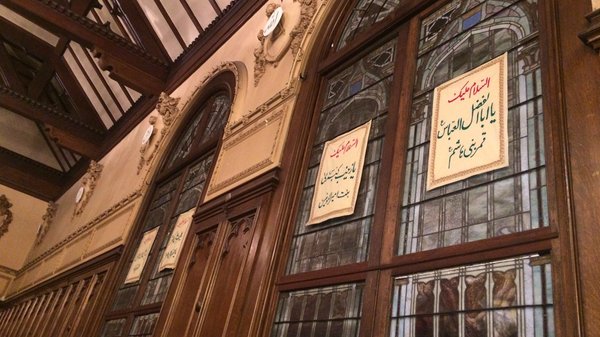Ahlul Bayt News Agency - Building bridges between American Sunnis and Shiites, a California mosque is using art, music and celebrations to bring members of the Muslim community together, bridging a deep gap void between the two sects.
"I think one missing thing ... right now, today, is beauty — really paying attention to the beauty of Islam, and its rich history," California mosque leader Ali Sheikhulislami told npr on Sunday, October 18.
Sheikhulislami, the leader of the Islamic Cultural Center of Northern California (ICCNC), was talking about activities being held by his mosque to break down divisions between Sunnis and Shiites.
In its majestic building, ICCNC tries to be a model of harmony between the two sects by hosting plays, open mic nights, painting and ceramics classes.
"Every inch of this building just has a meaning," manager Azita Sayyah says.
Being not like an average mosque, white, black and Asian people, some in embroidered green Sufi robes, others in black Shiite turbans or flowing white Arab jalabeyas, pack ICCNC.
"It's a unique experience," says Ali Saadeghi.
"If you go to a traditional Muslim place, that's not something that you're gonna get. It's more fun, and it's a good place for my kid and my wife to enjoy."
The United States is home to a Muslim community of between six to eight million.
A recent survey about mosques in the United States found that %7 of mosques in the country are Shiites.
The survey also showed that %44 of Shiite mosques in the United States opened in the 1990s.
Tolerance
The mosque has been favourable for many visitors, where they found rare harmony between Sunnis and Shiites.
"The unique thing about the American experience is ... we are able to come to this country and practice the religion the way we want to, and to do it in a way that we're tolerant of each other," said ICCNC's Ahmed Sheikhulislami.
A similar opinion was shared by Ali Sheikhulislami, the mosque leader, who believes that being far from the Middle East gives room for dialogue.
"We were talking to a friend, and he said, 'My mother is Sunni and my father is Shiite, so ... we call ourselves sushi!'" Sheikhulislami recalled.
"We like that! ... We are one; these things should not divide us. We are all humans. We're all sushi."
For Salman Mashayekh, an engineer from Santa Clara, infighting between the two sects is unacceptable.
“It’s nonsense, Shiite and Sunni people fighting each other and killing each other," he said.
“That's just not something the Prophet would not have wanted.
"We need to work together and sit with each other and listen each other out, and just have our own beliefs and not fight over anything," Mashayekh added.
High numbers of Shiites have immigrated to the United States following the US invasion of Iraq in 2003.
Differences between Shiites and Sunnis, however, were little noticed as members of the two sects prayed at the same mosques.
This was attributed to many reasons, including the high costs of building mosques.
/129
source : Websites
Tuesday
20 October 2015
10:57:05 AM
716021

Building bridges between American Sunnis and Shiites, a California mosque is using art, music and celebrations to bring members of the Muslim community together, bridging a deep gap void between the two sects.
